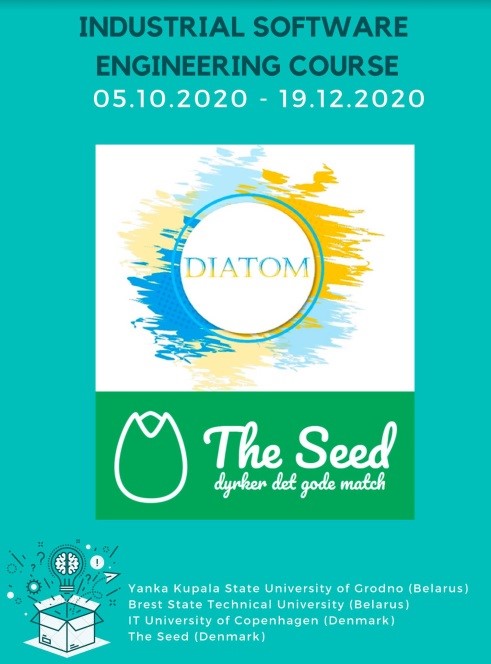
Yanka Kupala
State University of Grodno
Super User
|
Faculty |
||
|
Specialty |
1-21 80 11 Linguistics | |
| Language of study | English | |
| Mode of study | Full-time | |
| Term of study | 1 year | |
| Entrance exams for foreign citizens | ||
|
Curriculum (with an indication of the main disciplines studied) |
Names of master’s degree students’ activities, cycles of disciplines, disciplines | Number of credits |
|
|
|
6 |
|
3 | |
|
3 | |
|
6 | |
|
6 | |
|
9 | |
|
6 | |
|
6 | |
|
3 | |
|
3 | |
|
3 | |
|
3 | |
|
3 | |
|
3 | |
|
3 | |
|
3 | |
|
3 | |
|
3 | |
|
3 | |
|
The main competencies that the graduate will acquire |
|
|
|
Options to continue education (postgraduate specialties) |
• 10.02.20 Comparative-historical, typological and comparative linguistics • 10.02.01 Belarusian language • 10.02.02 Russian language • 10.02.19 Theory of language |
|
| Graduate certificate | MASTER’S DEGREE DIPLOMA | |
Yanka Kupala State University is expanding cooperation with one of the largest universities in Uzbekistan. On the 25th of March there was an online meeting with representatives of Karshin State University at Yanka Kupala State University
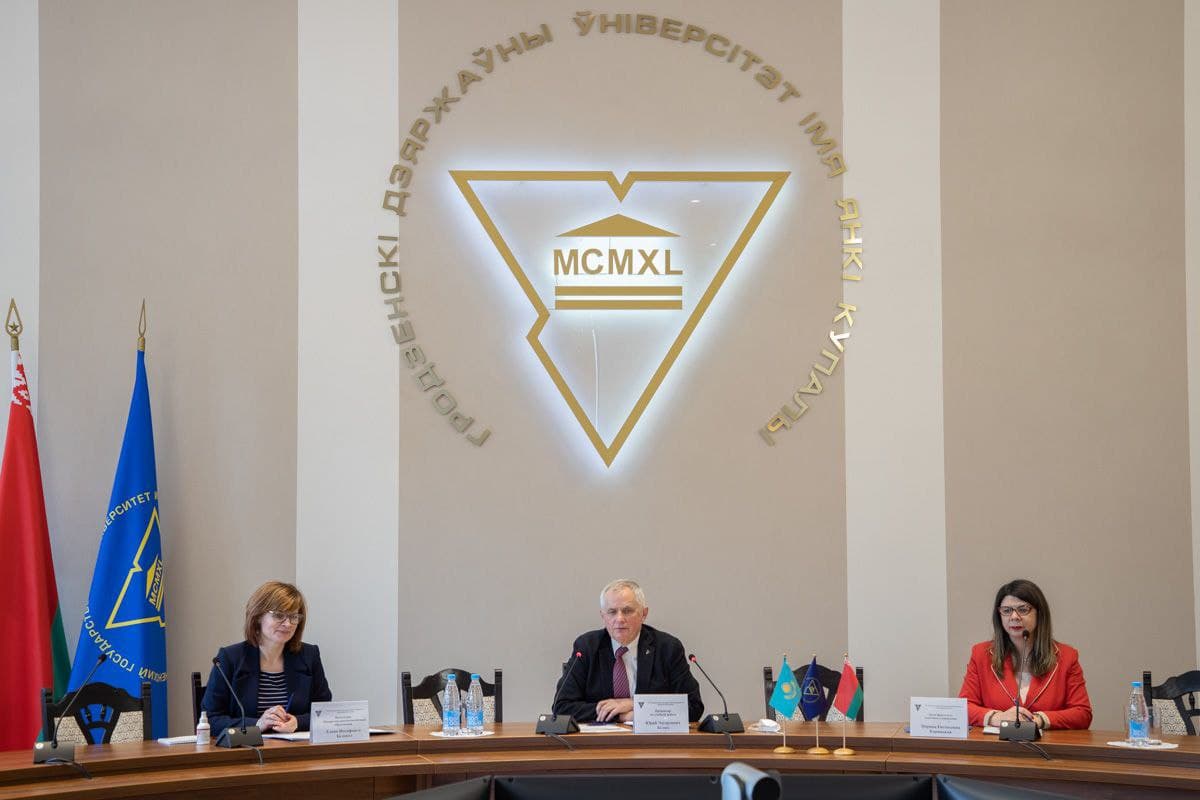
At the beginning of the meeting, the rector of the Yankф Kupala State University, Irina Kiturko, noted the effectiveness of the agreement on cooperation between Yanka Kupala State University and the Karshin State University.
– We can already be proud of some of the successes we have achieved - Irina Kiturko stressed. - The cooperation agreement between our universities was signed in March 2020. In May of last year, we concluded an agreement on realization of joint educational program «2+2» on preparation of specialists with higher education of the 1st stage in specialty «Applied mathematics» and are ready to expand cooperation. I’m sure the specialists who are present at the meeting have something to offer each other.
– There is a correlation between your offers and ours, - said the vice-principal for the educational work of the Yanka Kupala State University Yuri Belokh. - I think that the cooperation agreement we already have promotes the ideas voiced today. In the near future, we will need to concretize these proposals and make them part of a program of cooperation or a road map. The representatives of the Yanka Kupala State University invited colleagues from Karshin State University to participate in academic exchanges of staff for internships and lectures at partner universities, and invited them to participate in Yanka Kupala State University’s Activities.
– We are ready to share our findings and propose to organize scientific seminars at the department level in the near future, during which colleagues-scientists could get to know each other better, to establish personal contacts, - noted Yuri Romanovsky, Vice-Chancellor for scientific work of the Yanka Kupala State University. - I would also like to draw attention to the fact that the Science and Technology Park has been opened at Yanka Kupala State University, which could become a platform for creating a joint product with our foreign colleagues.
At the end of the meeting, the representatives of the Yanka Kupala State University and the Karshin State University agreed to document the most promising areas of cooperation in the near future and then to proceed with the implementation of the identified plans.
In the Yanka Kupala State University of Grodno students met with Lilia Kiryak, a deputy of the House of Representatives of the National Assembly of Belarus
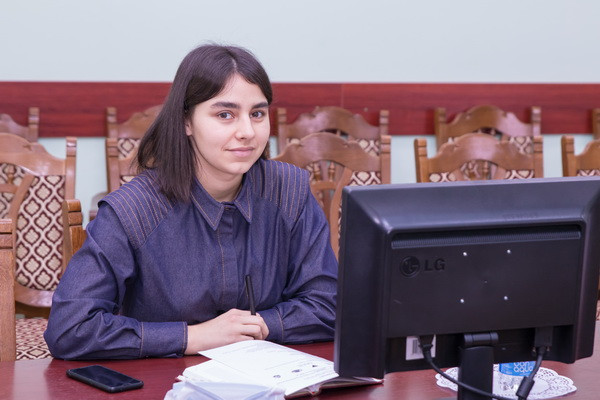
Students of Yanka Kupala State University of Grodno learned about the changes to be made to the updated Education Code and were invited to attend one of the spring parliamentary sessions.
Lilya Kiryak is the Deputy Chairman of the Permanent Commission on Education, Culture and Science of the House of Representatives of the National Assembly of Belarus. Welcoming the students of the University, she noted that it was very important for her to have a frank discussion on relevant topics with representatives of her home university.
– I look forward to an honest conversation and I’m ready to answer any questions or suggestions you may have, said Lilia Kiryak. - There are future teachers among you, so I am sure you will be interested to learn about some of the innovations of the draft new Code on Education of the Republic of Belarus.
According to the deputy, the draft of the new Code envisages the amendment of those articles that define the rights and obligations of participants in the educational process. Lilia Kiryak also drew attention to innovations in the bill related to social support for graduates of higher education institutions. In particular, young professionals and associated preferences now will be available to university graduates who have paid for higher education. The target enrolment in institutions of higher education will be expanded in order to ensure a personnel contract, and the restrictions for target areas will be removed on the basis of area. A further innovation is the adoption of the new Education Code, distance education as an independent form of education would be legislated, noted Lilia Kiryak.
During the meeting, the participants asked whether the status of Master would be enshrined in legislation. The Member of the House of Representatives replied that work was under way and that the status of the Master would subsequently be specified in a by-law. In addition, students were interested in the distribution of graduates, asked about the creation of conditions for the self-realization of young people in the chosen profession, discussed ideas on how to support young and talented children to stay in the study and work in the home country. They also spoke about various youth initiatives, volunteer activities and the importance of civic and patriotic education in the educational institutions of Belarus.
The students were particularly interested in the proposal Lilia Kiryak to participate in the parliamentary session. – We start on 4 April, and I invite you to attend one of the sessions. There are now serious legislative acts on the agenda, which are actively discussed by deputies. There are always many disputes, interesting proposals. See how the process of adoption of laws is going, - requested Lilia Kiryak.
In concluding the dialogue with the students of the Yanka Kupala State University of Grodno, Lilia Kiryak, a deputy of the Representatives House of the Belarus National Assembly, wished everyone good health, successful life and career
Yanka Kupala State University’s Professor Igor Martynenko participated in the 4th International Scientific-Practical Conference «Economic-Legal Problems Ensuring Economic Security»
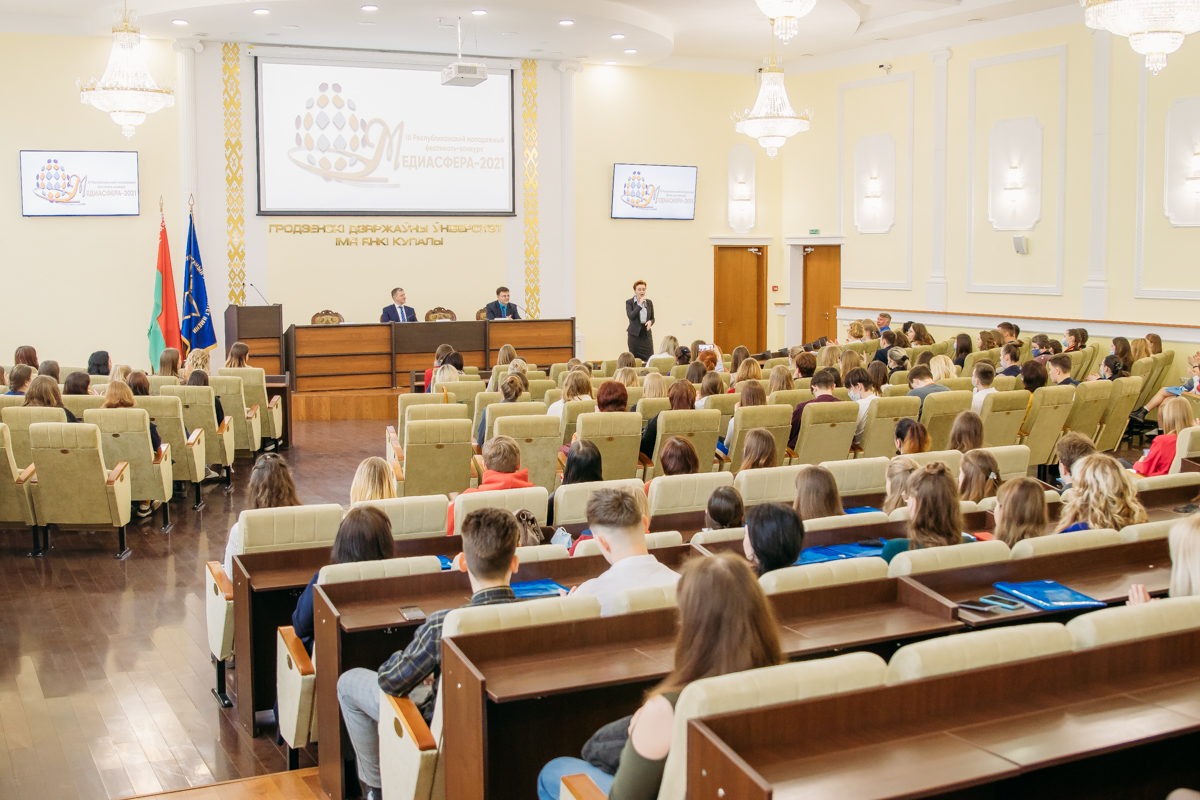
At the scientific forum in Yekaterinburg, the representative of the Yanka Kupala State University presented tools for minimizing and eliminating economic threats.
At the 4th International Scientific and Practical Conference «Economic and Legal Problems Ensuring Economic Security» Head of the Department of Civil Law and the Process of the Faculty of Law Igor Martynenko made a plenary presentation «Legal System of Economic Security: The Experience of the Republic of Belarus». During the discussion, Igor Eduardovich shared his views on the challenges and threats to economic security and the legal tools to counter them.
The conference was attended by lawyers and economists from universities and scholars from Azerbaijan, Belarus, Kazakhstan, Tajikistan and Russia. The Scientific Forum was held at the Ural State Economic University in Yekaterinburg with the support of the Ministry of Science and Higher Education of the Russian Federation.
Applicants with high achievements in academic subjects, creativity or sports can count on an incentive supplement to the scholarship, as well as other benefits during training
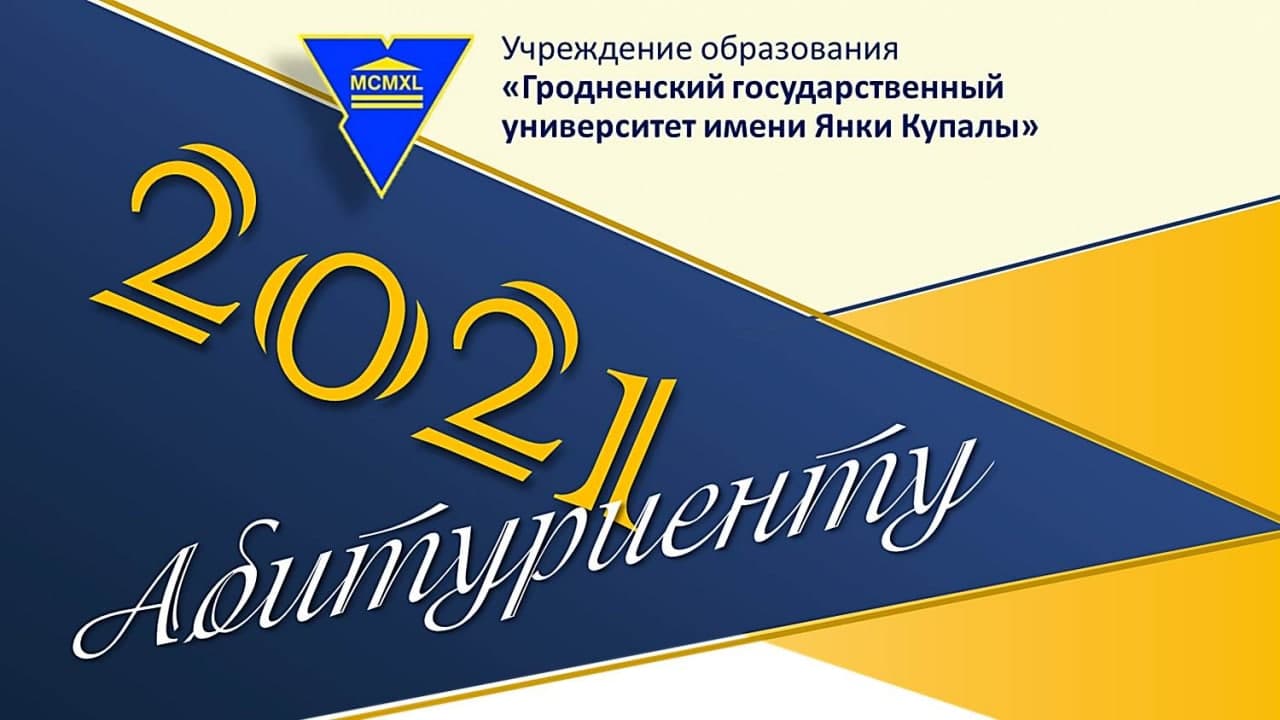
Holders of diplomas of the I, II, III degree of international Olympiads in accordance with the list approved by the Ministry of Education of the Republic of Belarus, as well as the Republican Olympiad in academic subjects, when enrolling in the 1st year, become participants of the loyalty program "At the top of Olympus – 50". The program also includes first-year students-winners of international and national creative competitions and festivals, Olympiads in the subjects of culture and art, winners of the International Championship "WorldSkills", the championships "WorldSkillsBelarus", "WorldSkillsRussia", "WorldSkillsAsia". Such applicants, when entering Yanka Kupala State University of Grodno, can count on an incentive supplement to the scholarship in the amount of 50 percent during the first semester of the 2021/2022 academic year, on research and project activities under the guidance of leading teachers and researchers of the university, as well as on the preferential right to study for one (two) semesters in leading Belarusian and foreign institutions of higher education.
Winners of the third (regional) and second (district, city) stages of the republican Olympiad in academic subjects and the regional stages of the WorldSkillsBelarus championship, as well as holders of diplomas of the I, II, III degree of the regional stage of the Olympiad in the academic subject "Drawing" among students of institutions of general secondary, vocational and secondary special education, when enrolling in Yanka Kupala State University of Grodno, are guaranteed an incentive supplement to the scholarship in the amount of 30 percent during the first semester of the 2021/2022 academic year, provided that, that they do not receive a higher incentive supplement to the scholarship under the loyalty program "At the top of Olympus-50".
First-year students from among the winners of the multidisciplinary Olympiad of Yanka Kupala State University of Grodno "Yanka Kupala University Olympiad", held in 2019/2020 and 2020/2021 academic years, can count on an incentive supplement to the scholarship in the amount of 30 percent during the first semester of the 2021/2022 academic year within the framework of the program "Together to new Heights". In addition, they will be given a preferential right to study for one (two) semesters in leading Belarusian and foreign institutions of higher education.
Among other activities of Yanka Kupala State University of Grodno Loyalty Program for applicants is an incentive supplement to the scholarship in the amount of 20 percent during the first semester of the 2021/2022 academic year for one first-year student of each of the pedagogical specialties who scored the highest number of points on two profile entrance tests. Such first-year students will be given the priority right to choose the base of pedagogical practice.
Yanka Kupala State University of Grodno is waiting for motivated, capable and gifted applicants who are focused on a high level of education and have the qualities of research and business activity and initiative. Realize your potential together with Yanka Kupala State University of Grodno!
New courses were designed and modernized at Yanka Kupala State University of Grodno within the project “Modernisation of Master Curriculum in ICT for Enhancing Student Employability” (MaCICT)
1. Design of Experiment course
2. Enterprise Informatization Systems course
3. Database Design and Maintenance course
4. Information Architecture and Interface Prototyping course
5. Strategy and Management of IT Projects and Systems course
6. Rhetoric and Academic Writing course
7. Commercialization of Research Results course
8. Intercultural, business and personal communications course
9. IT Career Management course
10. Business Presentation Technologies course
ness and Management course
More information about the new courses designed by our partners within this project may be found via the link: http://macict.eu/index.php/en/courses
The first Infoday in this year was held at Yanka Kupala State University of Grodno within the project “Modernisation of Master Curriculum in ICT for Enhancing Student Employability” (MaCICT)
On the Infoday the representatives of the project’s work group informed and updated 26 students and 7 teachers on the current state of the MaCICT-project, its benefits and impact on the future.
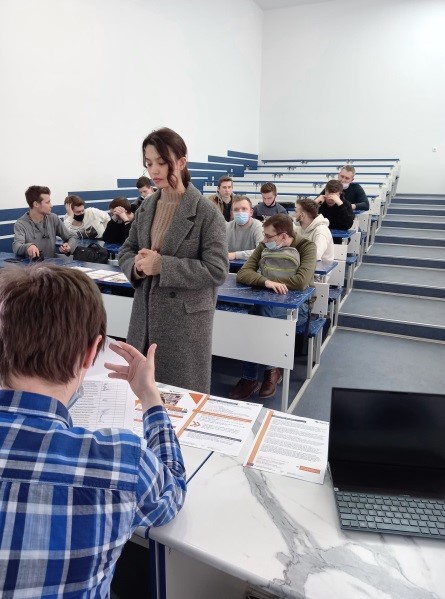
As part of dissemination, the MaCICT-project’s partners created leaflets about the project and work results. New leaflets created by YKSUG were presented to the invited students and teachers on the Infoday.
They may be found via the link: https://www.grsu.by/images/Documents/28079_1.pdf
MACICT special edition: The brightest events of the second year of implementation
«Our project has reached the last year and this is a good time to see the results. MACICT partners in Belarus have developed unique Master's Courses in IT that optimally prepare students for a career in this sector. Learning-by-Doing is an important part of the modernized courses. In this way we have implemented several international projects in which students have developed different software. With MACICT, we have prepared the perfect springboard for students to pursue successful careers after graduation. Becoming a Master with MACICT is worth it!», said Prof. Dr. Juho Mäkiö, project coordinator.
More information about the MACICT outcomes and outputs of the second year of implementation may be found via the link:
https://www.grsu.by/images/Documents/27347_1.pdf
A seminar was held at the Faculty of Mathematics and Informatics to disseminate the experience of participation and the results of the MACICT project
The information about MACICT current state and future work may be found via the link: https://www.grsu.by/images/Documents/28101_0.pdf
The information about development of the course «Design of Experiment» may be found via the link: https://www.grsu.by/images/Documents/28101_1.pdf
Students of the YKSUG and BrSTU united in the DIATOM team and took part in the course "Industrial Software Engineering" driven by our partner, IT-University of Copenhagen
DIATOM worked on The Seed project which is a digital tool that enables more efficient integration of refugees in the Danish labor market.
The team’s goal was to create a Job Center Dashboard to allow job center employees register newly unemployed people and follow their journey on their way of finding a job.
The team applied Scrum and practiced many modern technologies (NodeJS, ReactJS, GraphQL, Docker, Kubernetes).
